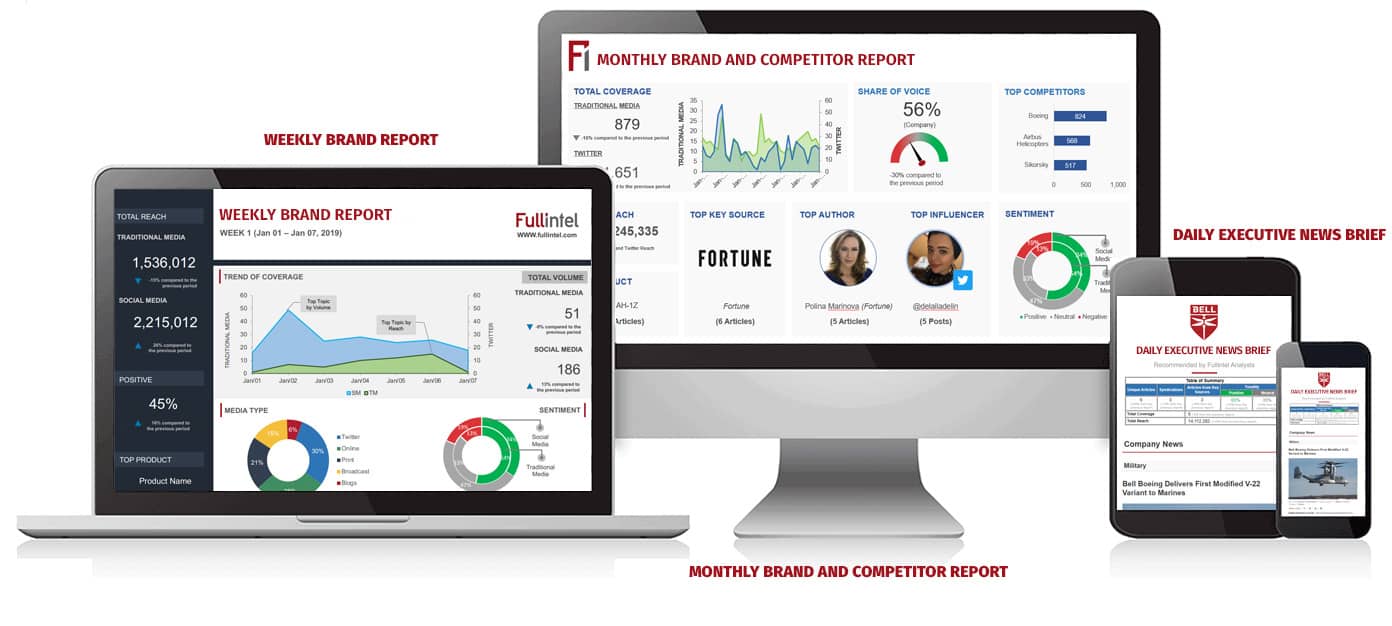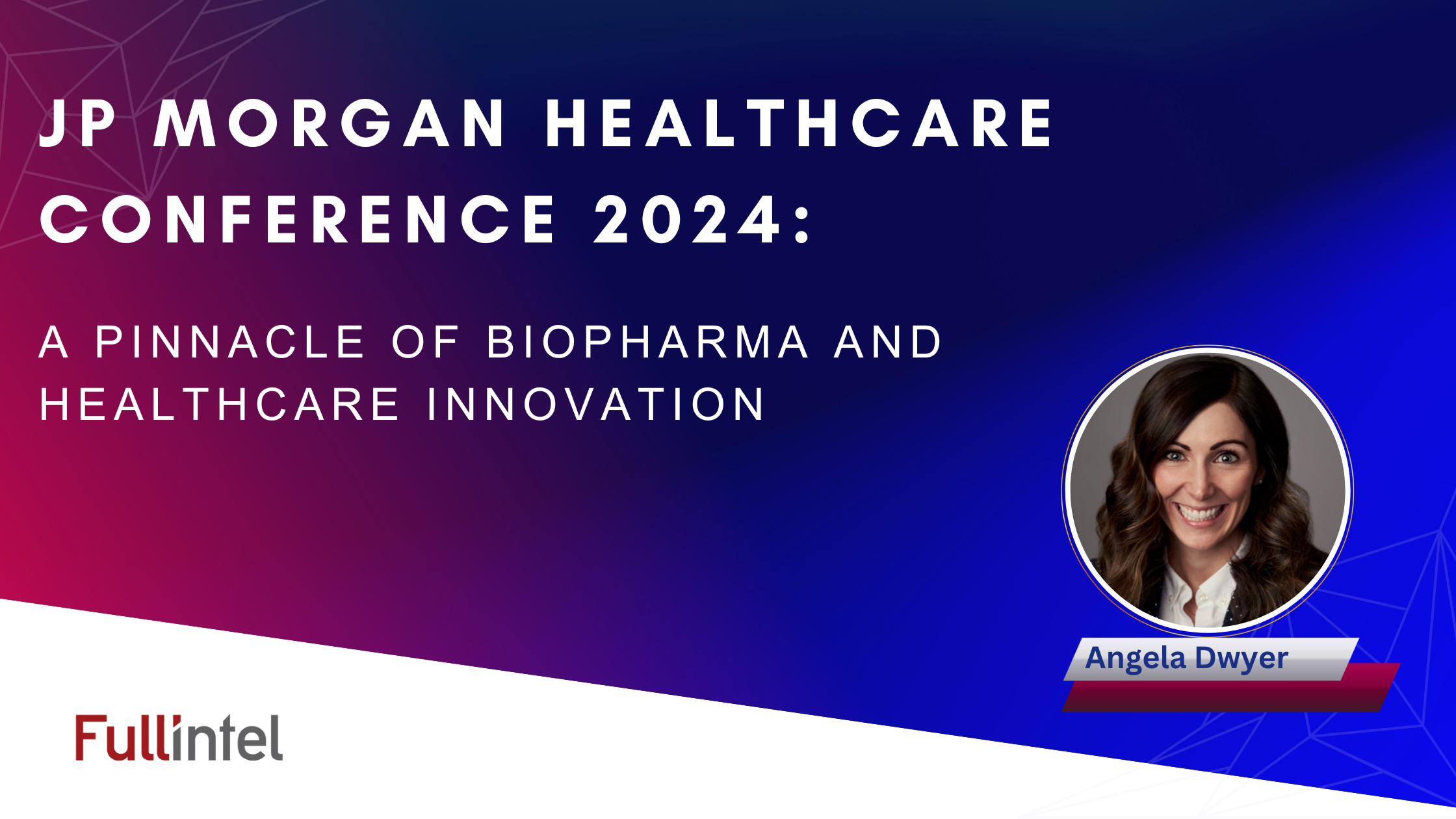
The JP Morgan (JPM) Healthcare Conference is a premier annual event in the healthcare industry, bringing together global industry leaders, emerging fast-growth companies, innovative technology creators, and members of the investment community. This conference serves as a platform for companies to present their latest developments, discuss challenges and opportunities in the healthcare sector, and explore potential partnerships and deals.
A significant aspect of the JP Morgan Healthcare Conference is its role in shaping investment and M&A activities within the healthcare industry. Companies often use this event to announce major mergers, acquisitions, and partnerships, making it a closely watched event for market-moving news.
In addition to business discussions, the conference also addresses broader healthcare issues such as patient care, regulatory environments, and technological advancements. It’s a key gathering for those looking to stay abreast of the rapidly evolving healthcare landscape.
Key participants from this year’s event included executives from pharmaceutical companies, biotechnology firms, medical device manufacturers, healthcare service providers, and finance professionals specializing in healthcare investments. The conference featured a series of presentations, panel discussions, and networking opportunities, allowing attendees to gain insights into the latest trends, scientific breakthroughs, and business strategies in healthcare.
Key Takeaways From JPM 2024
The JPM 2024 Conference brought together leaders from the health and life sciences industries, offering a platform for sharing insights and developments. Key takeaways from this year’s event highlight significant trends and shifts in the industry:
Active Collaborations in Pharma: There’s a strong interest in collaborations with big pharma, particularly in areas like neuroscience, metabolic disorders, oncology, and AI-driven drug development. This suggests a growing trend towards cooperative efforts and strategic alliances, which are seen as crucial for advancing research, development, and patient care.
Big Tech in Life Sciences: Companies like NVIDIA and Amazon are making significant strides in healthcare and life sciences through partnerships and initiatives. For instance, NVIDIA is delving into Generative AI for drug discovery, while Amazon is expanding into chronic condition management through its program with Omada Health.
AI in Drug Development: AI is a central topic, with emphasis on its growing importance in drug development and other aspects of the life sciences industry. The focus is on the quality of AI models and data, and how these technologies are being integrated into various processes.
Cell and Gene Therapy Advances: The FDA’s recent approvals in gene therapy for sickle cell disease bring optimism to the field. This year, more approvals are expected, and there is a growing acceptance of the value and potential of these therapies.
Rise of Antibody-Drug Conjugates (ADCs): ADCs emerge as a significant area of interest, particularly in oncology research. This indicates a renewed focus and potential in this therapeutic area.
Retail Health Integration Efforts: Companies like Amazon, CVS Health, and Walgreens are intensifying their efforts to integrate health services with retail experiences. Amazon, for instance, is linking health device purchases to chronic condition programs, while CVS Health focuses on integrating its acquisitions to deliver more value to consumers. Meanwhile, Walgreens is using its stores and brands to bolster its developing healthcare business.
These takeaways indicate a dynamic shift towards more digital and AI-driven approaches in healthcare, an increased focus on collaborations, and a strong emphasis on technology integration and innovative therapies.
Notable Trends During JPM 2024
The JPM Healthcare Conference 2024 highlights several key trends, including advancements in AI and automation technologies in drug discovery and clinical trials, a focus on gene therapies with FDA support, and an optimistic market outlook with robust M&A potential. Additionally, there is an emphasis on collaborations in the pharma sector, particularly in areas like neuroscience and metabolic disorders. Major healthcare companies, including those in retail health, are strategically integrating assets and focusing on earnings, while payers and health tech companies are paying attention to GLP-1 drugs and the potential of generative AI.
Trend Analysis
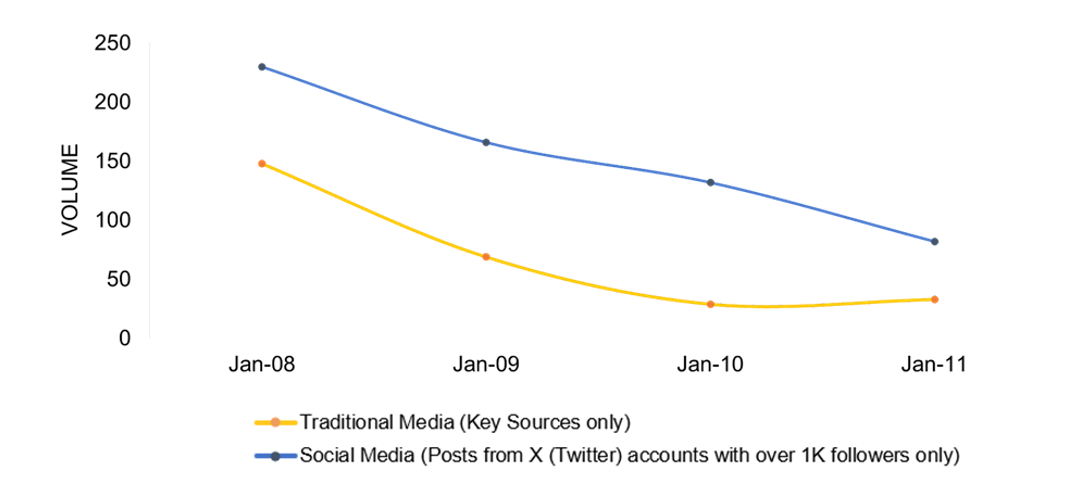
The traditional and social coverage sees a downward trend over the 4-day period. On day 1, there’s a significant buzz about companies announcing their participation and presentations at the conference. This day also sees the announcement of various deals and partnerships, a trend that continues throughout the event. Discussions about innovation trends and the integration of AI into diagnostics and healthcare are prominent topics during the conference. Additionally, cell and gene therapy, along with ADCs, generate considerable media hype.
Social Media Engagement and Sentiment Analysis
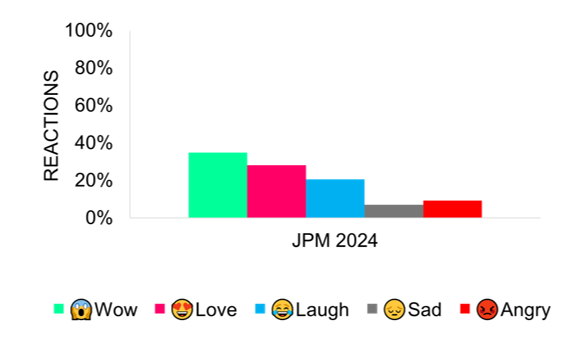
The social sentiment surrounding JPM 2024 is predominantly positive, marked by cautious optimism in collaborations and enthusiasm for AI and technology integration, driving the ‘Wow’ and ‘Love’ reactions. Innovations in healthcare technologies, especially in glucose monitoring, are also well-received.
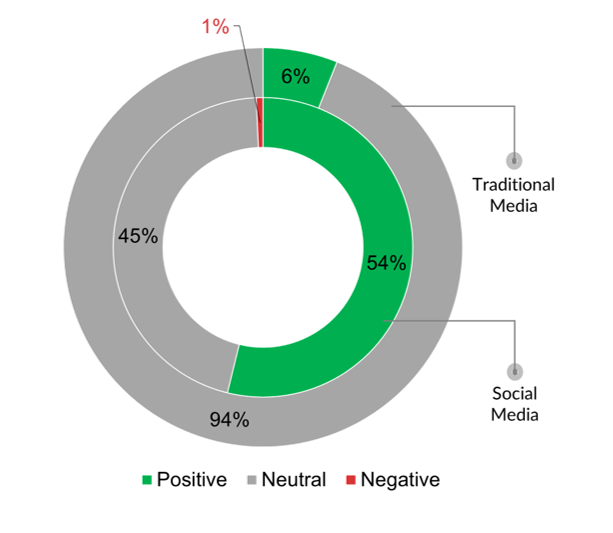
Neutral sentiments dominate at JPM 2024, revolving around biotechs announcing their attendance at JPM, especially over social media. Enthusiasm for AI and technology integration generates positive responses across traditional and social media. Collaborations also garner interest, highlighting the industry’s proactive partnership approach. Some minor negative sentiments arise from online articles, discussing Pfizer’s challenges in 2023 and the lack of adequate facilities for new mothers attending the event.
Keynote Speakers and Session Insights
The JPM 2024 conference showcases an impressive lineup of keynote speakers, including Rt. Hon. Tony Blair, Executive Chairman of the Institute for Global Change and former Prime Minister of Great Britain and Northern Ireland; Danielle Carnival, Ph.D., Deputy Assistant to the President for the Cancer Moonshot initiative and Deputy Director for Health Outcomes at the White House Office of Science and Technology Policy; Sarah K. Emond, President & CEO of the Institute for Clinical and Economic Review; Richard Francis, CEO of Teva Pharmaceuticals; and Ken Keller, Chairman of the Board, President and CEO, and Global Head of Oncology Business at Daiichi Sankyo, Inc.
The conference covers a variety of crucial topics in the biopharma and healthcare sectors, highlighting the impact of new regulations and technological advancements. Over half of the session speakers involved executives from pharmaceutical companies, providing insights into the regulatory landscape, treatment breakthroughs, and the strategic deployment of AI. Notable company presentations include Dexcom discussing advancements in glucose monitoring technology, Johnson & Johnson MedTech highlighting their growth through mergers and acquisitions, and Abbott talking about the success of its FreeStyle Libre CGM, which has now reached over 5 million users worldwide. Presenters from technology companies explore the latest advancements in integrating technology into healthcare, including Amazon’s partnership with Omada Health to launch a health monitoring program, while experts from Microsoft, GE Healthcare, and Boston Consulting Group discuss the practical applications of Generative AI in biotech and healthcare in a panel at the conference.
Session Speaker Organizations in the News during JPM
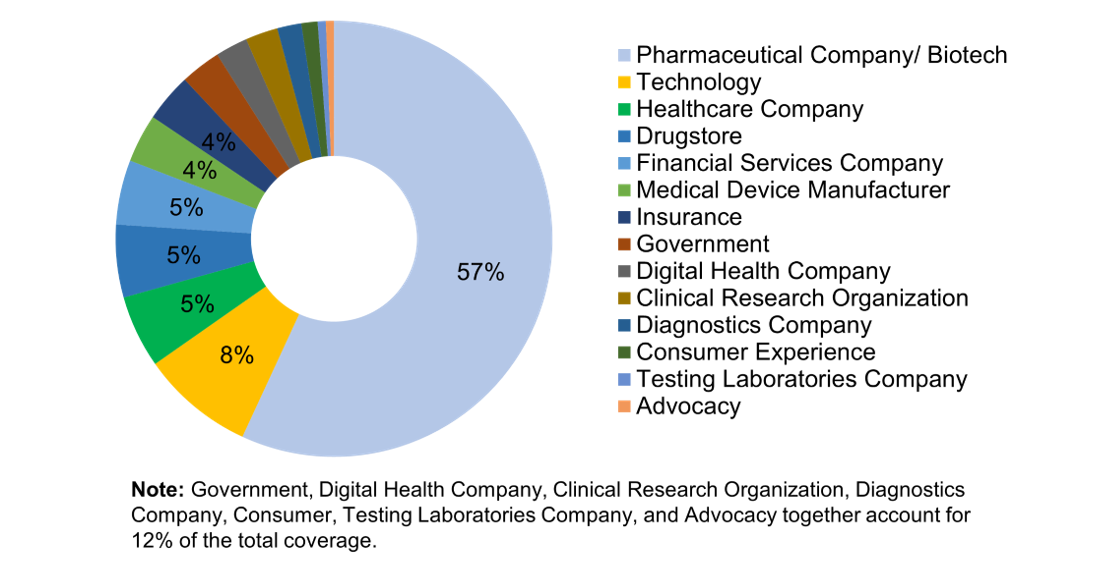
Deals and Partnerships Summary
This Conference is the birthplace of a lot of deals, with companies announcing major transactions in the run-up. Key transactions include Bristol-Myers Squibb’s acquisition of Karuna Therapeutics for $14 billion, illustrating a significant investment in expanding its portfolio in neuroscience, and RayzeBio’s new deals worth $1.4 billion aimed at bolstering its cancer therapy business. AstraZeneca makes a strategic acquisition of Gracell for $1.2 billion, strengthening its presence in the cell therapy space. Boston Scientific announces a $3.7 billion deal to acquire Axonics, which specializes in neurostimulation therapies for urinary and fecal incontinence. Veracyte inks a $95 million deal to buy C2i Genomics, a company specializing in tests to detect minimal residual disease after cancer treatments. Major players like Johnson & Johnson, Novartis, and Merck also announced acquisitions, signaling a trend toward consolidation in the industry. Additionally, GSK is actively involved in acquisition activities, further underlining the dynamic nature of the pharmaceutical landscape. Meanwhile, Jefferson Health reveals a merger with LVHN, aiming to double its insurance business within two years.
These deals reflect a robust mergers and acquisitions environment, driven by strategic growth and consolidation efforts within the sector.
Key Topic Discussions
More than a third of the central discussions are dominated by ‘Company Updates,’ encompassing pipeline advancements, financial results, and future projections from major players like Pfizer, BioNTech, Eikon Therapeutics, and Cogent Biosciences, among others.
The conference set off a healthcare deal frenzy, surpassing a staggering $6 billion in transactions. Standouts include Merck & Co.’s whopping $680 million takeover of Harpoon Therapeutics, Boston Scientific Corp.’s monumental $3.7 billion acquisition of Axonics Inc., and Johnson & Johnson’s eye-popping $2 billion pact with Ambrx Biopharma. GSK‘s $1.4 billion swoop to acquire asthma innovators, Aiolos Bio, adds a compelling chapter to the ‘Deal & Collaboration’ narrative.
Given the rapidly accelerating trend, it’s no surprise that AI stole the spotlight, with Nvidia’s jam-packed session unveiling a game-changing partnership with Amgen, harnessing the mighty Freyja to turbocharge AI model training and revolutionizing drug discovery. Amazon stormed in with Health Condition Programs, teaming up with Omada Health to manage chronic conditions like diabetes and high blood pressure, marking its entry into healthcare. Alphabet’s biotech company, Isomorphic Labs, partnering with Eli Lilly and Novartis to leverage its AI platform for the development of small molecule drugs, also captures the participants’ attention.
‘Cell and gene therapy’ emerge as pivotal treatments in modern medicine, offering potential cures for a range of life-threatening diseases, including rare genetic disorders and severe cardiovascular disease. 2023 marked a significant breakthrough with multiple FDA approvals, highlighting the sector’s rapid growth and the promise of these therapies in treating conditions previously deemed incurable.
Recursion’s introduction of LOWE, a drug discovery software with a natural language interface, and Nvidia’s technology significantly accelerating Amgen’s AI drug discovery model training enhances current developments in the ‘Drug Discovery/Development’ sector.
A prominent story in ‘Oncology’ focuses on PrognomiQ’s groundbreaking research on early-stage lung cancer detection using its multi-omics liquid biopsy platform, while in the ‘GLP-1’ topic, the spotlight is on major drugmakers, including Novartis AG, actively acquiring biotech companies to expand markets such as obesity. In ‘ADC’, Johnson & Johnson’s significant $2 billion investment in ADCs through the acquisition of Ambrx is a key development.
Top Topics in the News during JPM
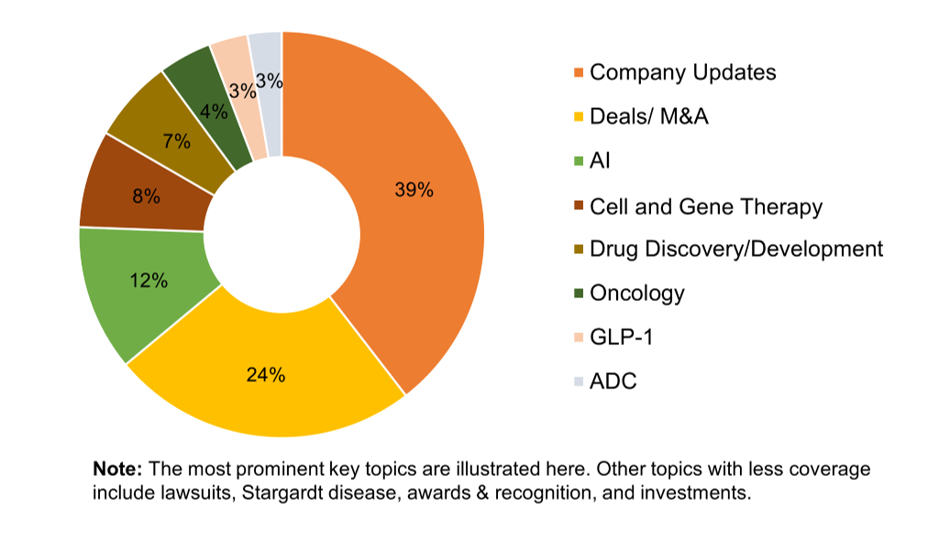
Conclusion
In summary, the JPM 2024 Healthcare Conference has once again proven to be a critical nexus for the biopharma and healthcare industries, showcasing a vivid tapestry of innovations, strategic collaborations, and significant business deals, highlighting the sector’s dynamic evolution. The conference’s focus on cutting-edge topics like AI in drug development, advancements in cell and gene therapy, and the rise of antibody-drug conjugates underscored the industry’s commitment to leveraging technology for groundbreaking medical advancements. The enthusiastic participation of key industry players from various sectors, including big tech firms, pharmaceutical giants, and retail health, reflects a holistic approach to healthcare challenges and solutions. As the industry moves forward, the insights and developments shared at JPM 2024 will undoubtedly shape the future of healthcare, driving innovation, fostering partnerships, and enhancing patient care in the years to come.


